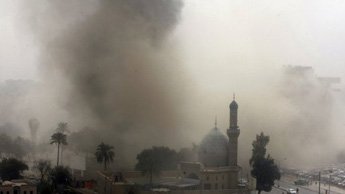A suicide bombing against a mosque as worshippers streamed out was the deadliest of attacks across Iraq that left 39 dead on Wednesday, part of a surge in violence.
 A suicide bombing against a mosque as worshippers streamed out was the deadliest of attacks across Iraq that left 39 dead on Wednesday, part of a surge in violence.
A suicide bombing against a mosque as worshippers streamed out was the deadliest of attacks across Iraq that left 39 dead on Wednesday, part of a surge in violence.
Dozens were wounded in the bloodshed, and locals exacted a grim revenge on one man suspected of being a second attacker in the mosque bombing, which comes amid Iraq's worst bloodshed since 2008.
The worst of Wednesday's violence struck the confessionally-mixed north Baghdad neighborhood of Waziriyah, where a suicide bomber blew himself up at a mosque at around 6:40 pm (1540 GMT) as worshippers were exiting following evening prayers.
At least 30 people were killed and 55 others wounded, an interior ministry official and a police source said.
Immediately after the bombing, locals spotted a man they suspected was about to blow himself up as well, the sources said.
No group immediately claimed responsibility for the attack against the Tamimi mosque.
Violence elsewhere in the country left seven people killed, including four in the restive northern province of Nineveh.
In three separate attacks in the province, which remains one of Iraq's least stable, gunmen killed three people, among them a school principal who was shot dead at his house.
And in provincial capital Mosul, a magnetic "sticky bomb" attached to a car killed another person.
Another sticky bomb killed one person in south Baghdad, and another died in a roadside bombing in a town on the capital's southern outskirts, while a gunman on a motorcycle killed a religious cleric near the southern port city of Basra.
Although attacks have continued to hit much of the country, with more than 4,000 people killed in violence already this year, officials have vowed to press on with a campaign targeting militants they say has led to the capture of hundreds of fighters and the killing of dozens more, as well as the dismantling of militant training camps and bomb-making sites.
Authorities have also sought to tackle the unrest with a string of measures ranging from massive security operations targeting militants to implementing tight restrictions on vehicle movement in the capital in a bid to stem the number of car bombs.